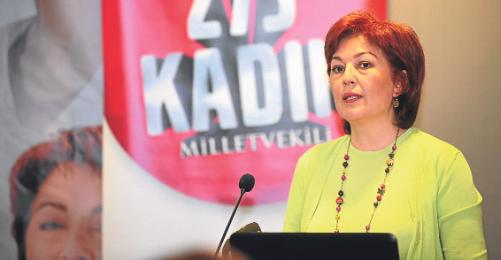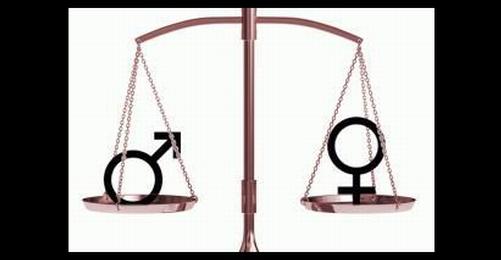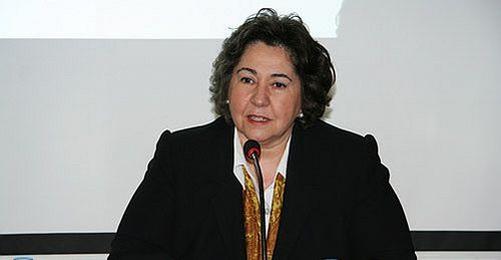Nese Yasin, a Turkish Cypriot poet, who moved to the Greek Cypriot south in protest of the division of Cyprus, and who is carrying out her struggle for a reunification, is upset about the referendum results. But she has not lost her hope.
Like Yasin, Turkish Cypriot journalist Sevgul Uludag, writer Fatma Azgin, Guzin Ince, head of the Turkish Cypriot Teachers' Union (KTOS), and activist Bahire Korel from "Hands Across the Divide" group, are hopeful of solution and peace.
"We demand a unified Cyprus, not to be recognized"
All these women believe that the Turkish Cypriots, by voting "yes," have said "yes" to peace and solution as well as to the Annan plan, and "no" to Turkish Cypriot President Rauf Denktas and to the status quo.
They advocate that Rauf Denktas should resign as soon as possible. According to these women, the biggest danger awaiting Cyprus is the forgetting of dreams of a "United Cyprus," the rise of nationalism, and the strengthening of demands that the breakaway Turkish Cypriot state, the Turkish Republic of Northern Cyprus (TRNC), is recognized.
The women, who believe that the Greek Cypriots were defeated by their fears and voted "no" in the referendum, said the pro-peace groups on the north and south were not successful in creating a consciousness of a common homeland.
"The anger toward and disappointment in Greek Cypriots should be prevented and ways should be found to work together for a united Cyprus," said Sevgul Uludag. She added:
"The embargo is not the only problem in Cyprus. The main problem is the existence of conditions of a cease-fire on the island. There is no permanent peace; there is a constant potential for clashes, and youth on both sides stand guard at the army in the front lines with each other. Without solving these problems, lifting embargos would not have a meaning."
Yasin: Only 13 percent do not want unification
* Turkish Cypriots said "yes" for the unification of Cyprus. But recognizing TRNC would lead to the absolute division of the island. For now, we have not been able to unify the island but we should object to it being absolutely divided.
* 23 percent of Greek Cypriots said "yes" to reunification. But most of the Greek Cypriots said "no" at the referendum because they had fears. The traumas of the 1970s continue in the south. Greek Cypriots are afraid of the Turkish army. They fear that the government in Turkey may change and with it, the whole picture may change.
* 73 percent of Greek Cypriots, who voted "no" at the referendum, said they did so because of security concerns. Only 13 percent said they did not want to live with Turkish Cypriots.
Uludag: A consciousness of a common homeland was not created
* On the south, the state and the church lead an intensive "no" campaign. The media was not objective in conveying the contents of the Annan plan. Those who were supportive of the plan were faced with threats and a defamation campaign.
* Denktas is responsible of the "no" vote on the south as much as Greek Cypriot President Tassos Papadopoulos is. Denktas, during the period before the referendum, gave negative messages to Greek Cypriots. And Prime Minister of the TRNC, Mehmet Ali Talat, did not pursue a positive approach that would relieve the minds of Greek Cypriots and that would show them that he understood their fears and concerns.
* And despite the fact that the travel ban was lifted a year ago, peace activists were not successful in creating a consciousness of a common homeland. The embraces of people after 30 years were not transformed into a political will or consciousness. The contact between two communities remained at a personal level.
* We could not root the notion of a common homeland. And even today, we start our sentence by saying, "We as Greek Cypriots, or Turkish Cypriots, what did we gain, what did we lose." But instead, we need to be thinking about "what the Cypriots have gained or lost."
* I have not lost hope because every one out of four people on the Greek Cypriot side said "yes" in the referendum. Now, we need to spend efforts to bring this up to 30 percent, which is seen as the critical level.
Azgin: Greek Cypriots left us alone with the status quo
* We tried very hard for peace and solution, for a unified Cyprus and for democracy. We said, "yes" at the referendum so that the status quo could come to an end. By saying "no," the Greek Cypriots left us alone with the status quo.
* There is difference between Turkey's happiness over the "yes" vote and ours. Turkey looks at the referendum outcome as a "diplomatic victory." We want the system in Cyprus to change.
* Even those in supportive of peace and solution in Cyprus started saying, "TRNC should be recognized." But that was not our demand. Our goal was to create a common administration based on the Annan plan. We could not do that, but on May 1, we, as Turkish Cypriots, will join the EU.
Ince: The EU should work for a second referendum on the south
* Seeing that 65 percent of Turkish Cypriots said "yes" at the referendum was very nice for us after struggling for years for a united Cyprus. The outcome of the referendum on the south did not come as a shock. For me, the ideal outcome would be the creation of a unified Cyprus.
* We need to continue with our struggle with new, sensible strategies so that a unified Cyprus can join the EU. We need to continue cooperation and dialogue with Greek Cypriots.
* Rauf Denktas has to resign. No matter how many times Denktas says: "We have gotten the outcome we wanted," he should not forget that "yes" votes are, at the same time, votes against Denktas.
* The EU has to work for a second referendum on the south, and so that a unified Cyprus enters the EU.
Korel: Turkey should withdraw its troops from Cyprus
* The outcome of the referendum on the Greek Cypriot side was not pleasing. But because the Annan plan was a U.S. plan, the Greek Cypriots have legitimate reasons for saying "no."
* The referendum results do not mean that our chance is over. Turkey should continue to work for a solution in Cyprus. And it should start doing this by withdrawing its troops from Cyprus.
* We want Cyprus to be united. We don't have a desire for the international community to recognize us. The international community would not recognize a state on the territories of someone else anyway. The lifting of embargos may relieve us economically. But this would not have much meaning since there is no production in north Cyprus.
* Turkey, since Saturday night, seems to be saying: "Whatever we did, we did it together with Denktas." And this makes us doubt that the Turkish military wants peace in Cyprus. (BB/YS/EA/YE)









